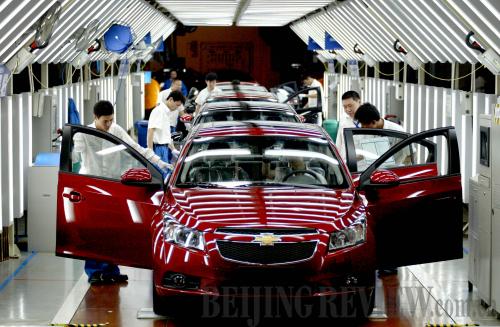|
 |
|
ECONOMIC PRESENCE: An assembly line of the Shanghai General Motors Co. Ltd. (CFP) |
The Pentagon's latest strategic review once again marked the U.S. shift of focus to the Asia-Pacific region. In the view of many Chinese, the new strategy highlights the possibility of a new "Cold War" between China, a rapidly emerging economy, and the United States, the global superpower.
This might be a misunderstanding. The United States is pivoting to Asia not to fight against China, but to gain more economic interests in the region, including in China. So China doesn't need to be worried about the military threat, but has to prepare to cope with a disadvantaged position in an unequal international economic order determined by the United States for the long term.
Hegemonic powers in history, from ancient Babylonia, Persia and Rome to the British Empire, all employed military, political and trade means to plunder the treasures of other countries. Chinese revolutionary Sun Yat-sen said in 1917 that the key to British hegemony was not its parliamentary system or industrial revolution, but the treasures of India. Only by controlling the tremendous wealth of India could Britain sustain its powerful navy, occupy colonies around the world and dominate overseas markets. Throughout the 19th century, Britain contained emerging powers such as France, Russia and Germany one after another as its foreign policy. The primary purpose was consistent—preventing them from sharing India and other colonies, the economic lifeline of the British Empire.
Unlike past hegemonic powers, which directly seized the wealth of their colonies, the United States has expanded its strategy to include the whole international system. U.S. hegemony was established and sustained through the current international monetary, financial and trade systems. Since the dollar serves as an international reserve currency, the United States does not need to acquire costly reserves of its own. While emerging economies earn foreign exchange through trade, the United States can always print more dollars. Moreover, the dollars that other central banks keep in reserve are mostly in the form of government bonds. The extra demand weighs on bond yields and sets a lower threshold for the cost of credit, allowing the United States to spend freely. The privilege of being a major reserve currency issuer also helps finance U.S. investments in other countries as well as U.S. military bases abroad.
Unparalleled armed forces serve as the most effective means for the U.S. Government to sustain its economic hegemony. Most parts of the world today, from Latin America, West and Central Europe and the Middle East to the Asia-Pacific region, are covered by the U.S. defense system. There are more countries receiving the safeguard of the United States now than during the Cold War. But whether it is Japan, South Korea, Afghanistan or Iraq, any state must pay for the defense umbrella, economically or politically. In recent years, the United States has interfered in the South China Sea territorial disputes between China and some Southeast Asian countries not only for political purposes but also for selling munitions to those countries to earn a profit.
The U.S. dollar supremacy gives the financial sector of the United States a remarkably dominant position as a main source of funds for the world. This enables the United States to call the shots in the global financial system. The United States assumes the leadership role in many important international economic organizations, including the International Monetary Fund (IMF), the World Bank, the World Trade Organization (WTO) and the Organization for Economic Cooperation and Development.
|
